| Listing 1 - 10 of 10 |
Sort by
|

ISBN: 1282858106 9786612858109 0773567879 9780773567870 9781282858107 6612858109 9780773518520 0773518525 Year: 1999 Volume: 27 Publisher: Montreal : McGill-Queen's University Press,
Abstract | Keywords | Export | Availability | Bookmark
 Loading...
Loading...Choose an application
- Reference Manager
- EndNote
- RefWorks (Direct export to RefWorks)
These appropriations fall into two main groups: those pertaining to the name Böhme or a life assigned to it, and those involving concepts or images from the mystic's oeuvre. The first group constituted an attempt to co-opt the aura of sanctity attached to portrayals of the poet-prophet in order to invest Romantic Poesie with the sacral standing of religion. The second group, exemplified by Friedrich Schlegel and Friedrich Schelling, involved the borrowing and radical redefinition of a few concepts and images from Böhme's work in the hope of bridging the gap between the abstract first principle of idealism and the personal God that became an emotional necessity for both thinkers. Jena Romanticism and Its Appropriation of Jakob Böhme treats the Romantic reception of Böhme as a striking example of how the past is appropriated and rewritten in the service of self-affirmation. Analysing the need and the techniques for this self-affirmation sheds light on the nature of the self to be affirmed and on the content and underlying motivation of the Romantic program.
Romanticism --- Philosophy, German --- Böhme, Jakob, --- Böhme, Giacomo, --- Boehme, Jacob, --- Böhme, Jacob, --- Boehm, Jacob, --- Behmen, Jacob, --- Behme, Jacob, --- Behm, Jacob, --- Teutonicus, --- Teutonicus Philosophus, --- I. B. T., --- T., I. B., --- I. B., --- B., I., --- Teut, I. B., --- A. S., --- S., A., --- Boehme, Jakub, --- Boehme, Jakob, --- Theosophy --- Romanticism - Germany. --- Philosophy, German - 19th century. --- Theosophy - Germany. --- Böhme, Jakob --- Böhme, Giacomo --- Böhme, Jacob --- Boehme, Jacob --- Böhme, Jacob --- Boehm, Jacob --- Behmen, Jacob --- Behme, Jacob --- Behm, Jacob --- Teutonicus --- Teutonicus Philosophus --- I. B. T. --- T., I. B. --- I. B. --- B., I. --- Teut, I. B. --- A. S. --- S., A. --- Boehme, Jakub --- Boehme, Jakob --- Bohme, Jakob,
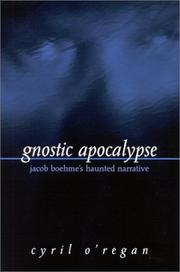
ISBN: 0791489507 0585450307 9780585450308 0791452018 9780791452011 0791452026 9780791452028 9780791489505 Year: 2002 Publisher: Albany : State University of New York Press,
Abstract | Keywords | Export | Availability | Bookmark
 Loading...
Loading...Choose an application
- Reference Manager
- EndNote
- RefWorks (Direct export to RefWorks)
"Jacob Boehme, the seventeenth century German speculative mystic, influenced the philosophers Hegel and Schelling and both English and German Romantics alike with his visionary thought. Gnostic Apocalypse focuses on the way Boehme's thought repeats and surpasses post-reformation Lutheran thinking, deploys and subverts the commitments of medieval mysticism, realizes the speculative thrust of Renaissance alchemy, is open to esoteric discourses such as the Kabbalah, and articulates a dynamic metaphysics. This book critically assesses the striking claim made in the nineteenth century that Boehme's visionary discourse represents within the confines of specifically Protestant thought nothing less than the return of ancient Gnosis. Although the grounds adduced on behalf of the "Gnostic return" claim in the nineteenth century are dismissed as questionable, O'Regan shows that the fundamental intuition is correct. Boehme's visionary discourse does represent a return of Gnosticism in the modern period, and in this lies its fundamental claim to our contemporary philosophical, theological, and literary attention."--BOOK JACKET
Böhme, Jakob, --- Böhme, Giacomo, --- Boehme, Jacob, --- Böhme, Jacob, --- Boehm, Jacob, --- Behmen, Jacob, --- Behme, Jacob, --- Behm, Jacob, --- Teutonicus, --- Teutonicus Philosophus, --- I. B. T., --- T., I. B., --- I. B., --- B., I., --- Teut, I. B., --- A. S., --- S., A., --- Boehme, Jakub, --- Boehme, Jakob, --- Mysticism. --- Dark night of the soul --- Mystical theology --- Theology, Mystical --- Spiritual life --- Negative theology --- Böhme, Jakob --- Böhme, Giacomo --- Böhme, Jacob --- Boehme, Jacob --- Böhme, Jacob --- Boehm, Jacob --- Behmen, Jacob --- Behme, Jacob --- Behm, Jacob --- Teutonicus --- Teutonicus Philosophus --- I. B. T. --- T., I. B. --- I. B. --- B., I. --- Teut, I. B. --- A. S. --- S., A. --- Boehme, Jakub --- Boehme, Jakob --- Bohme, Jakob,
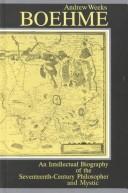
ISBN: 0585091803 9780585091808 0791405966 0791405974 1438423497 Year: 1991 Publisher: Albany : State University of New York Press,
Abstract | Keywords | Export | Availability | Bookmark
 Loading...
Loading...Choose an application
- Reference Manager
- EndNote
- RefWorks (Direct export to RefWorks)
Mystics --- Mysticism --- Religion --- Philosophy & Religion --- Christianity --- Persons --- Dark night of the soul --- Mystical theology --- Theology, Mystical --- Spiritual life --- Negative theology --- History --- Biography --- Böhme, Jakob, --- Böhme, Giacomo, --- Boehme, Jacob, --- Böhme, Jacob, --- Boehm, Jacob, --- Behmen, Jacob, --- Behme, Jacob, --- Behm, Jacob, --- Teutonicus, --- Teutonicus Philosophus, --- I. B. T., --- T., I. B., --- I. B., --- B., I., --- Teut, I. B., --- A. S., --- S., A., --- Boehme, Jakub, --- Boehme, Jakob, --- Böhme, Jakob, --- Böhme, Jakob --- Böhme, Giacomo --- Böhme, Jacob --- Boehme, Jacob --- Böhme, Jacob --- Boehm, Jacob --- Behmen, Jacob --- Behme, Jacob --- Behm, Jacob --- Teutonicus --- Teutonicus Philosophus --- I. B. T. --- T., I. B. --- I. B. --- B., I. --- Teut, I. B. --- A. S. --- S., A. --- Boehme, Jakub --- Boehme, Jakob
Book
ISBN: 9004275215 9789004275218 9789004275201 9004275207 1322223378 Year: 2015 Publisher: Leiden, Netherlands : Brill,
Abstract | Keywords | Export | Availability | Bookmark
 Loading...
Loading...Choose an application
- Reference Manager
- EndNote
- RefWorks (Direct export to RefWorks)
In this book, Professor Simuț shows how Christian theology started to be understood as a Gnostic philosophy of religion in the thought of the 19th-century scholar F. C. Baur. Although Baur was seen traditionally as a theologian and biblical exegete, Simuț argues that he was in fact a philosopher of religion, and it was his philosophical reading of Christian theology that informed his biblical preoccupations. Specifically, Baur’s perspective on Christian theology was heavily influenced by Jakob Böhme’s esoteric theosophy and Hegel’s religious philosophy in some key issues such as creation, Lucifer, dualism and the connection between spirit and matter coupled with that between philosophy and religion.
Religion --- Gnosticism. --- Philosophical theology. --- Theology, Philosophical --- Philosophy and religion --- Theology, Doctrinal --- Cults --- Philosophy. --- Baur, Ferdinand Christian, --- Böhme, Jakob, --- Böhme, Giacomo, --- Boehme, Jacob, --- Böhme, Jacob, --- Boehm, Jacob, --- Behmen, Jacob, --- Behme, Jacob, --- Behm, Jacob, --- Teutonicus, --- Teutonicus Philosophus, --- I. B. T., --- T., I. B., --- I. B., --- B., I., --- Teut, I. B., --- A. S., --- S., A., --- Boehme, Jakub, --- Boehme, Jakob, --- Influence. --- Böhme, Jakob --- Böhme, Giacomo --- Böhme, Jacob --- Boehme, Jacob --- Böhme, Jacob --- Boehm, Jacob --- Behmen, Jacob --- Behme, Jacob --- Behm, Jacob --- Teutonicus --- Teutonicus Philosophus --- I. B. T. --- T., I. B. --- I. B. --- B., I. --- Teut, I. B. --- A. S. --- S., A. --- Boehme, Jakub --- Boehme, Jakob
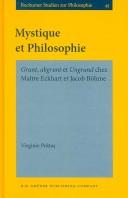
ISSN: 1384668X ISBN: 1282155547 9786612155543 9027293422 9789027293428 9789060323762 9060323769 9060323769 Year: 2006 Volume: 45 Publisher: Amsterdam ; Philadelphia : B.R. Gruner,
Abstract | Keywords | Export | Availability | Bookmark
 Loading...
Loading...Choose an application
- Reference Manager
- EndNote
- RefWorks (Direct export to RefWorks)
Par le biais d'une méthode philologique, historique, et philosophique, ce livre établit l'absence de lien direct entre Maître Eckhart et Jacob Böhme. En réalité, le concept de la "philosophie mystique allemande", commençant soit disant avec Eckhart et finissant avec Böhme, a son origine dans la philosophie romantique du 19ème siècle et est toujours en usage aujourd'hui. L'étude se concentre sur la théorie eckhartienne du "grunt" et de l'"abgrunt" et sur sa relation possible avec la théorie böhmienne de l'"Ungrund". elle montre que les différences entre les deux théories sont essentielles et qu'elles aboutissent à une opposition philosophique profonde entre l'intellectualisme de Maître Eckhart et le volontarisme de Böhme. Ainsi, il faudrait réviser aussi bien la relation de Böhme à Maitre Eckhart que la place de ce dernier au sein de l'histoire de la philosophie.Through methods of philology, history, and philosophy, this book establishes that there is no direct connection between Master Eckhart and Jacob Böhme. The concept of the "German mystic philosophy", starting supposedly with Eckhart and ending with Böhme, actually has its origin in the Romantic philosophy of the 19th century and and is still usual today. This study focuses on the eckhartian theory of the "grunt" and "abgrunt" and its possible relation to the böhmist theory of the "Ungrund". It shows that the differences between both theories are significant and that they culminate in a deep philosophical opposition between the intellectualism of Master Eckhart and the voluntarism of Böhme. Thus, both Böhme's relationship to Master Eckhart and the position of the latter in the history of philosophy should be revised.
Mysticism --- Philosophy, German --- History. --- Eckhart, --- Böhme, Jakob, --- Dark night of the soul --- Mystical theology --- Theology, Mystical --- Böhme, Giacomo, --- Boehme, Jacob, --- Böhme, Jacob, --- Boehm, Jacob, --- Behmen, Jacob, --- Behme, Jacob, --- Behm, Jacob, --- Teutonicus, --- Teutonicus Philosophus, --- I. B. T., --- T., I. B., --- I. B., --- B., I., --- Teut, I. B., --- A. S., --- S., A., --- Boehme, Jakub, --- Boehme, Jakob, --- Eckart, --- Eckehart, --- Eckhart, Johannes, --- Ekharti, --- Ėkkhart, --- Spiritual life --- Negative theology --- German philosophy --- Terminology --- History --- Mysticisme --- Philosophie allemande --- Histoire --- Christian spirituality --- Eckhart [Meister] --- Böhme, Jacob --- Terminology. --- Böhme, Jakob, --- Böhme, Jakob --- Böhme, Giacomo --- Boehme, Jacob --- Böhme, Jacob --- Boehm, Jacob --- Behmen, Jacob --- Behme, Jacob --- Behm, Jacob --- Teutonicus --- Teutonicus Philosophus --- I. B. T. --- T., I. B. --- I. B. --- B., I. --- Teut, I. B. --- A. S. --- S., A. --- Boehme, Jakub --- Boehme, Jakob --- Eckhart --- Böhme, Jakob --- Germany --- Philosophy [German ] --- Mysticism - Germany - History. --- Philosophy, German - History. --- Mysticism - Terminology. --- Philosophy, German - Terminology. --- Eckhart, - Meister, - -1327 --- Böhme, Jakob, - 1575-1624. --- Bohme, Jakob,
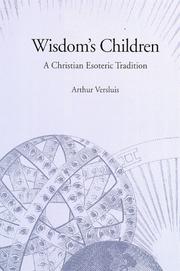
ISBN: 0585307636 9780585307633 0791443299 0791443302 1438422903 9781438422909 Year: 1999 Publisher: Albany, NY : State University of New York Press,
Abstract | Keywords | Export | Availability | Bookmark
 Loading...
Loading...Choose an application
- Reference Manager
- EndNote
- RefWorks (Direct export to RefWorks)
Mysticism. --- Mysticism --- Theosophy. --- Theosophy --- Occultism --- Hermetism. --- Gnosticism --- Wisdom --- Cults --- Hermeticism --- Christianity and occult sciences --- Dark night of the soul --- Mystical theology --- Theology, Mystical --- Spiritual life --- Negative theology --- Cosmology --- Religions --- Anthroposophy --- History. --- Religious aspects --- Christianity. --- Influence. --- Böhme, Jakob, --- Böhme, Giacomo, --- Boehme, Jacob, --- Böhme, Jacob, --- Boehm, Jacob, --- Behmen, Jacob, --- Behme, Jacob, --- Behm, Jacob, --- Teutonicus, --- Teutonicus Philosophus, --- I. B. T., --- T., I. B., --- I. B., --- B., I., --- Teut, I. B., --- A. S., --- S., A., --- Boehme, Jakub, --- Boehme, Jakob, --- Esoteric Christianity --- Western esoteric --- Protestantism. --- Böhme, Jakob --- Böhme, Giacomo --- Böhme, Jacob --- Boehme, Jacob --- Böhme, Jacob --- Boehm, Jacob --- Behmen, Jacob --- Behme, Jacob --- Behm, Jacob --- Teutonicus --- Teutonicus Philosophus --- I. B. T. --- T., I. B. --- I. B. --- B., I. --- Teut, I. B. --- A. S. --- S., A. --- Boehme, Jakub --- Boehme, Jakob
Book
ISBN: 9401773386 9401773394 Year: 2016 Publisher: Dordrecht : Springer Netherlands : Imprint: Springer,
Abstract | Keywords | Export | Availability | Bookmark
 Loading...
Loading...Choose an application
- Reference Manager
- EndNote
- RefWorks (Direct export to RefWorks)
This book investigates Hegel’s interpretation of the mystical philosophy of Jakob Böhme (1575-1624), considered in the context of the reception of Böhme in the 18th and 19th centuries, and of Hegel’s own understanding of mysticism as a philosophical approach. The three sections of this book present: the historical background of Hegel’s encounter with Böhme’s writings; the development of two different conceptions of mysticism in Hegel’s work; and finally Hegel’s approach to Böhme’s philosophy, discussing in detail the references to Böhme both in published writings and manuscripts. According to Hegel, Böhme is “the first German philosopher”. The reason for placing Böhme at the very beginning of German philosophy is that Hegel considers him to be a profound thinker, despite his rudimentary education. Hegel’s fascination with Böhme mainly concerns the mystic’s understanding of the symbiotic relation between God and his opposite, the Devil: he considers this to be the true speculative core of Böhme’s thought. By interpreting Böhme, Hegel intends to free the speculative content of his thought from the limitations of the inadequate, barbarous form in which the mystic expressed it, and also to liberate Böhme from the prejudices surrounding his writings, placing him firmly in the territory of philosophy and detaching him from the obscurity of esotericism. Combining historical reconstructions and philosophical argumentation, this book guides the reader through an important phase in German philosophy, and ultimately into an inquiry about the relationship between mysticism and philosophy itself.
Philosophy (General). --- Philosophers --- Böhme, Jakob, --- Böhme, Giacomo, --- Boehme, Jacob, --- Böhme, Jacob, --- Boehm, Jacob, --- Behmen, Jacob, --- Behme, Jacob, --- Behm, Jacob, --- Teutonicus, --- Teutonicus Philosophus, --- I. B. T., --- T., I. B., --- I. B., --- B., I., --- Teut, I. B., --- A. S., --- S., A., --- Boehme, Jakub, --- Boehme, Jakob, --- Philosophy. --- History. --- Religion. --- Modern philosophy. --- History of Philosophy. --- History, general. --- Religious Studies, general. --- Modern Philosophy. --- Religion, Primitive --- Atheism --- God --- Irreligion --- Religions --- Theology --- Annals --- Auxiliary sciences of history --- Modern philosophy --- Mental philosophy --- Humanities --- Philosophy --- Philosophy, Modern. --- Early Modern Philosophy.
Book
ISBN: 9781939521347 1939521343 0985244089 9780985244088 Year: 2013 Publisher: Indianapolis : Strategic Media Books,
Abstract | Keywords | Export | Availability | Bookmark
 Loading...
Loading...Choose an application
- Reference Manager
- EndNote
- RefWorks (Direct export to RefWorks)
Just as young journalist Lark Chadwick is about to begin her new job on the cops and courts beat, she discovers the body of a strangled girl - the first victim of a serial killer. Lark's got the inside track, but there are complications: jealous rivals in the newsroom, her job in danger, a hunky colleague who becomes a suspect, a superstar athlete with anger issues. And just who is that mysterious bag boy at the local market? With the help of her friend and mentor Lionel Stone, Lark's nerve is tested like never before in a dramatic life or death showdown with the killer. Troubled Water is the third installment in the Lark Chadwick mystery suspense series written by long-time CNN journalist John DeDakis.
Labor unions --- Gangsters --- Mafia --- Teamsters --- Transport workers --- Cosa Nostra --- Criminals --- Officials and employees --- Hoffa, James R. --- Hoffa, James Riddle, --- Hoffa, Jimmy, --- International Brotherhood of Teamsters, Chauffeurs, Warehousemen, and Helpers of America. --- Chauffeurs, International Brotherhood of --- Warehousemen, International Brotherhood of --- International Teamsters Union --- Teamsters Union --- IBT --- I.B.T. --- Truck Drivers, Chauffeurs and Helpers Union --- I.B. of T., C., W. and H. of A. --- International Brotherhood of Teamsters, Chauffeurs, Stablemen, and Helpers of America --- International Brotherhood of Teamsters --- E-books --- Hoffa, James R. (James Riddle), 1913-.
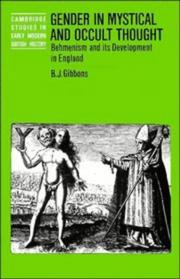
ISBN: 0511581874 0511000693 0521480787 0521526485 Year: 1996 Publisher: Cambridge : Cambridge University Press,
Abstract | Keywords | Export | Availability | Bookmark
 Loading...
Loading...Choose an application
- Reference Manager
- EndNote
- RefWorks (Direct export to RefWorks)
This is the first comprehensive account of the development of the ideas on gender of Jacob Boehme (1575-1624) among his English followers, tracing the changes in gender and sexuality in such esoteric traditions as alchemy, hermeticism and the Cabala. The book argues that Behmenist thought in these areas is a neglected aspect of the revision in the moral status of women during the early modern period, contributing significantly to the rise of the Romantic notion of womanhood and 'Victorian' sexual ideology. It deals with English Behmenism from its reception during the Interregnum through to its impact upon William Blake and the Swedenborgians in the eighteenth century. The book also strongly challenges received opinions on the relationship of Behmenism to the English radical tradition.
Sex --- Women --- Mysticism --- Occultism --- Dark night of the soul --- Mystical theology --- Theology, Mystical --- Spiritual life --- Negative theology --- Art, Black (Magic) --- Arts, Black (Magic) --- Black art (Magic) --- Black arts (Magic) --- Occult, The --- Occult sciences --- Supernatural --- New Age movement --- Parapsychology --- Gender (Sex) --- Human beings --- Human sexuality --- Sex (Gender) --- Sexual behavior --- Sexual practices --- Sexuality --- Sexology --- Human females --- Wimmin --- Woman --- Womon --- Womyn --- Females --- Femininity --- Religious aspects --- Christianity --- History of doctrines. --- History. --- Böhme, Jakob, --- Böhme, Giacomo, --- Boehme, Jacob, --- Böhme, Jacob, --- Boehm, Jacob, --- Behmen, Jacob, --- Behme, Jacob, --- Behm, Jacob, --- Teutonicus, --- Teutonicus Philosophus, --- I. B. T., --- T., I. B., --- I. B., --- B., I., --- Teut, I. B., --- A. S., --- S., A., --- Boehme, Jakub, --- Boehme, Jakob, --- Influence. --- Böhme, Jakob --- Böhme, Giacomo --- Böhme, Jacob --- Boehme, Jacob --- Böhme, Jacob --- Boehm, Jacob --- Behmen, Jacob --- Behme, Jacob --- Behm, Jacob --- Teutonicus --- Teutonicus Philosophus --- I. B. T. --- T., I. B. --- I. B. --- B., I. --- Teut, I. B. --- A. S. --- S., A. --- Boehme, Jakub --- Boehme, Jakob --- Arts and Humanities --- History --- History of doctrines --- Occultism - England - History. --- Mysticism - England - History. --- Behmenism.
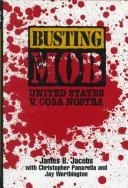
ISBN: 0814741959 0814742300 0814743951 0585262306 9780814743959 Year: 1994 Publisher: New York (N.Y.) : New York university press,
Abstract | Keywords | Export | Availability | Bookmark
 Loading...
Loading...Choose an application
- Reference Manager
- EndNote
- RefWorks (Direct export to RefWorks)
Since Prohibition, the Mafia has captivated the media and, indeed, the American imagination. From Al Capone to John Gotti, organized crime bosses have achieved notoriety as anti- heroes in popular culture. In practice, organized crime grew strong and wealthy by supplying illicit goods and services and by obtaining control over labor unions and key industries. Despite, or perhaps because of, its power and high profile, Cosa Nostra faced little opposition from law enforcement. Yet, in the last 15 years, the very foundations of the mob have been shaken, its bosses imprisoned, its profits diminished, and its influence badly weakened. In this vivid and dramatic book, James B. Jacobs, Christopher Panarella, and Jay Worthington document the government's relentless attack on organized crime. The authors present an overview of the forces and events that led in the 1980's to the most successful organized crime control initiatives in American history. Enlisting trial testimony, secretly taped conversations, court documents, and depositions, they document five landmark cases, representing the most important organized crime prosecutions of the modern era—Teamsters Local 560, The Pizza Connection, The Commission, the International Teamsters, and the prosecution of John Gotti.
343.944 <73> --- Mafia trials --- -Racketeering --- -Organized crime --- -Crime syndicates --- Organised crime --- Crime --- Crime syndicates --- Organized crime --- Mafia --- Trials of alleged mafia members --- Trials --- Beroepsmisdadigers. Georganiseerde misdadigheid--Verenigde Staten van Amerika. VSA. USA --- Bibliography --- International Brotherhood of Teamsters, Chauffeurs, Warehousemen, and Helpers of America --- -Chauffeurs, International Brotherhood of --- Warehousemen, International Brotherhood of --- International Teamsters Union --- Teamsters Union --- IBT --- I.B.T. --- Teamsters --- Truck Drivers, Chauffeurs and Helpers Union --- I.B. of T., C., W. and H. of A. --- International Brotherhood of Teamsters, Chauffeurs, Stablemen, and Helpers of America --- International Brotherhood of Teamsters --- Trials, litigation, etc --- Racketeering --- Bibliography. --- -Beroepsmisdadigers. Georganiseerde misdadigheid--Verenigde Staten van Amerika. VSA. USA --- -Trials, litigation, etc --- 343.944 <73> Beroepsmisdadigers. Georganiseerde misdadigheid--Verenigde Staten van Amerika. VSA. USA --- Chauffeurs, International Brotherhood of --- Civil RICO actions --- Trials, litigation, etc. --- United States --- Mafia trials - United States. --- Organized crime - United States - Bibliography.
| Listing 1 - 10 of 10 |
Sort by
|

 Search
Search Feedback
Feedback About UniCat
About UniCat  Help
Help News
News